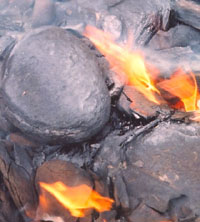
Photo from wikipedia
The effects of temperature on the permeability coefficients of carbonaceous shales and the underlying mechanisms have been investigated experimentally. Pressure-pulse-decay gas-permeability tests were performed on seven shale plugs with different… Click to show full abstract
The effects of temperature on the permeability coefficients of carbonaceous shales and the underlying mechanisms have been investigated experimentally. Pressure-pulse-decay gas-permeability tests were performed on seven shale plugs with different lithological compositions, organic-matter contents ranging from 0.8 to 11.7% total organic carbon (TOC) and thermal maturity between 0.53 and 1.45% random vitrinite reflectance (VRr). During the tests, the measuring temperatures were changed stepwise from 30 to 120°C and back to 30°C while axial load and confining pressure were kept constant. Sister plugs were used for mechanical tests to investigate the creep response upon thermal loading under the same temperature conditions. The samples showed varying degrees of permeability reduction by up to 71% with increasing temperature. This reduced permeability persisted during the cooling phase. The observed permeability changes reflect the elastoplastic deformation upon the thermal compaction of the rocks. Permeability reduction and creep response with increasing temperature are evidently controlled by organic matter, although clay minerals also played an important role. Organic-matter- and clay-rich shales exhibit the strongest response to temperature, while temperature effects were slightly smaller for overmature samples. Rock mechanical analysis showed that permeability reduction correlates with temperature-related creep/deformation of the shales. Given the strong temperature dependence of the mechanical stiffness of solid organic matter and of the viscosity of bituminous solids/liquids, more attention should be paid to temperature effects in the assessment of shale permeability. Our experimental results document that thermal stimulation has negative effects on shale-transport properties and that measurements conducted at laboratory temperatures can lead to substantial overestimation of in-situ shale permeability.
Journal Title: SPE Journal
Year Published: 2020
Link to full text (if available)
Share on Social Media: Sign Up to like & get
recommendations!